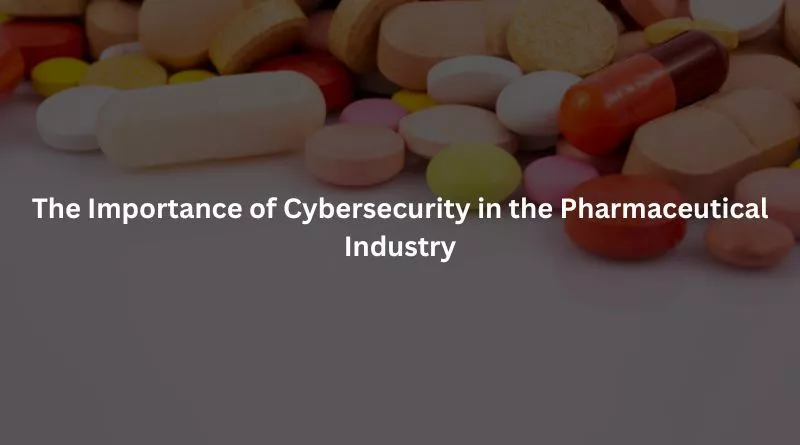The pharmaceutical industry is one of the most valuable sectors in the world, but its reliance on sensitive data and intellectual property makes it an attractive target for hackers.
Cybersecurity concerns are rising due to pharma companies’ growing reliance on third-party suppliers, adoption of digitization and industrial IoT (IIoT) technologies, and shift towards hybrid/multi-cloud environments. In addition, the current COVID pandemic is bringing cybersecurity to the forefront of this sector.
Regulatory Compliance
Regulatory compliance is one of the most important aspects of a pharmaceutical company’s business. It ensures that products are safe and effective. It also helps a company avoid effect recalls and other quality issues.
Across the entire industry, regulators oversee sales and marketing, drug price reporting, clinical operations, medical device testing, and manufacturing. Noncompliance can result in hefty fines and even criminal charges.
Pharmaceutical companies should prioritize regulatory compliance as it helps them stay on top of the latest guidelines and regulations and reduce the risk of fines or lawsuits. Maintaining compliance also prevents data loss, improves customer satisfaction, and helps a business save on costs.
The pharmaceutical industry must adhere to strict regulatory requirements worldwide as a global business. Moreover, regulatory frameworks often change to address world health concerns and respond to new standards.
To meet compliance, a company should establish procedures and work instructions that are easy to follow. These should be documented and reviewed by operational and quality control units.
A company that fails to do so can face serious consequences, including a 483 letter from the FDA. In 2020-2021, the FDA issued 80 violations for procedures not in writing and 44 for methods not followed thoroughly.
In addition to ensuring that the correct documentation is in place, a company should ensure those documents are only accessible to leaders and other key stakeholders. This will ensure that employees can only edit or change files with approval.
Data Security
Data security is a crucial issue throughout the product lifecycle in the pharmaceutical industry – from innovation to exit. Companies may need to protect trial data to ensure that new products meet quality standards; they might have to collaborate with partners in the late stages of a project, or they might need to safeguard patient information once a drug has been approved and released.
The use of data in the pharmaceutical industry is increasingly one of the opportunities for pharmaceutical industry as new technologies help improve the efficiency and efficacy of drug development. From leveraging IoT technology to improve the manufacturing process to developing innovative digital platforms and mobile apps that enhance patient engagement, these new technologies offer many opportunities for data-driven improvements.
However, data use also brings several challenges, such as security breaches and the potential for public disclosure of sensitive information. As a result, cybersecurity is becoming a top priority for the pharmaceutical industry.
One major challenge is that data can be easily leaked over the internet. Employees may accidentally send sensitive data to the wrong recipients, use insecure third-party services or even upload it to cloud storage websites. To prevent such threats, companies can deploy DLP solutions to search for files containing sensitive information and block them from being transferred.
DLP solutions also monitor the network and log any attempts to violate a policy, allowing them to take remediation action if necessary. In addition, these tools can detect the presence of removable devices such as USBs and external hard drives in the office environment and block access to them.
Data Breach Prevention
The pharmaceutical industry collects sensitive data, including proprietary information about patented drugs, pharmaceutical advances, and patient information. When that information is breached, it can potentially cause several serious issues.
For example, a security breach could risk the public’s trust in pharmaceutical companies. It can also lead to the loss of intellectual property and revenue.
Cybersecurity has become a significant concern for the pharmaceutical industry in the past decade. As a result, pharma companies are putting their data protection strategies in place to protect them against attacks.
With more pharma companies using digital platforms to improve patient outcomes and streamline their operations, they are exposing themselves to new cybersecurity risks. Cybercriminals are increasingly targeting the healthcare sector, and they want to exploit companies’ sensitive data to steal trade secrets, patents, and other intellectual property.
One of the biggest pharma security threats is cybercriminals who use ransomware to extort money from affected businesses. Sometimes, it can lead to intellectual property theft, resulting in millions of dollars in lost profits.
As a result, pharma companies must ensure their security strategies align with the latest industry trends and regulations. This will help them avoid the high costs and disruption that cyberattacks can cause.
Incident Response
Incident response is a process that includes detecting and responding to security events, such as cyber attacks or data breaches. It can help reduce the impact of an incident, prevent the loss of sensitive information and a company’s reputation, and mitigate financial losses.
Incident responders must be able to quickly assess the severity of a security event and prioritize their efforts accordingly. They also need to have the ability to scale up as required for more significant incidents.
For instance, a superficial virus infection can require minimal resources, while a data breach could have an extensive investigation and long-term remediation.
Fortunately, most of these issues can be prevented with proper prevention measures and proactive security strategies. Moreover, it is essential to maintain a regularly tested incident response plan.
Preventative measures include maintaining a secure network, limiting user access to sensitive data, and educating employees about the risks of security threats. Monitoring user behavior for signs of suspicious activity and taking necessary action is also crucial.
Pharmaceutical companies should develop and maintain an incident response plan based on a risk assessment and network diagrams. These plans should be updated as threats evolve and new exploits are discovered. They should also be integrated into the organization’s incident command system to facilitate the unified response of multiple teams.







